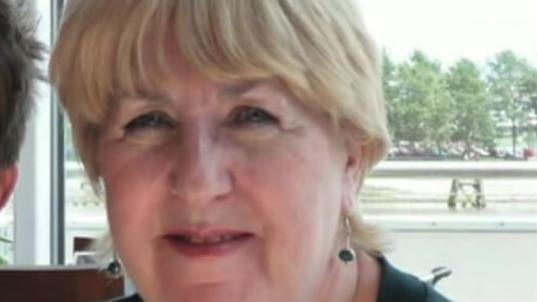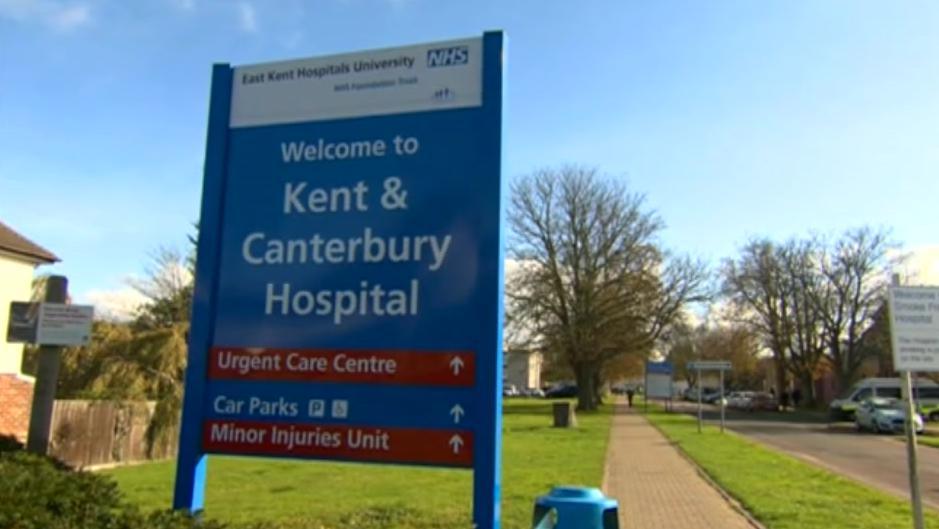Woman died after being sent home from hospital

Marion Llewellyn died from peritonitis after being fitted with a stent because of kidney stones
At a glance
Marion Llewellyn died from sepsis and peritonitis after a plastic stent was fitted, a coroner rules
She was taken to hospital with severe abdominal pain, but sent home when an X-ray showed nothing wrong with the stent
The Maidstone coroner said further tests should have been performed
The East Kent Hospitals Trust says a full investigation has been carried out following Mrs Llewellyn's death
- Published
A woman who died from sepsis might have lived if all necessary examinations had been carried out, a coroner has ruled.
Marion Llewellyn, 66, of Canterbury, Kent, had been sent home from the Kent and Canterbury Hospital, but was readmitted after five days, before dying three weeks later.
A coroner in Maidstone ruled she died from peritonitis and sepsis because clinical investigations were not performed.
East Kent Hospitals Trust said a full investigation into Mrs Llewellyn's death has been carried out.
Mrs Llewellyn had had a plastic stent fitted on 8 February 2021 after an operation to remove kidney stones, the inquest was told.
On 18 February that year she went to the Kent and Canterbury Hospital Urgent Care Centre with severe abdominal pain, nausea and vomiting.
The doctor on duty believed the symptoms were caused by the stent but an X-ray showed it was in the correct position.
But Prof Sarah O’Dwyer, a consultant surgeon acting as an expert witness, said blood tests carried out were abnormal enough to alert the clinician to a possible infection.
She said the next step would have been to seek advice from a senior colleague, with further blood tests and examinations possibly leading to hospital admission.
Instead Mrs Llewellyn was sent home, coroner Joanne Andrews heard.

Mrs Llewellyn was sent home from the Kent and Canterbury Hospital, but later died of sepsis and peritonitis
On 23 February, Mrs Llewellyn was taken by ambulance to the Queen Elizabeth the Queen Mother Hospital in Margate and diagnosed with peritonitis and sepsis. She died at the hospital on 15 March.
Ms Andrews returned a narrative verdict saying Mrs Llewellyn died from a bowel perforation, which had caused peritonitis and then sepsis.
She said when Mrs Llewellyn attended the Kent and Canterbury Urgent care centre on 18 February 2021 she was diagnosed with stent-related symptoms.
However, fatal peritonitis was not identified because clinical investigations were not carried out that would have detected it.

Nick Lewellyn believes his mother would be alive today if she had received the correct treatment
Speaking after the hearing, Mrs Llewellyn's son Nick said: "For those few days coming home, she's in absolute agony.
"If only everything was sorted out on the 18th and she was properly diagnosed and treated, she'd probably still be here today.
"That is something that's going to sit with us for the rest of our lives."
A spokesperson from East Kent Hospitals said: “We would like to offer our sincere condolences to Mrs Llewellyn’s family and we are very sorry for the failings in her care.
"Following her death, a full investigation took place to identify what went wrong and to learn lessons from it.”
Follow BBC South East on Facebook, external, on Twitter, external, and on Instagram, external. Send your story ideas to southeasttoday@bbc.co.uk, external.